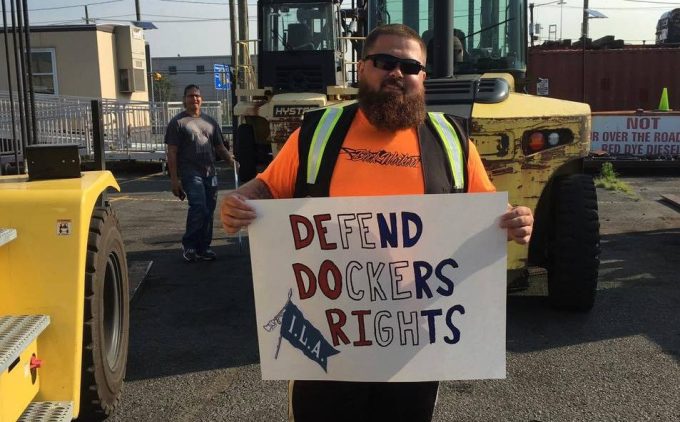The big question: what is the future for the global port labour force?
There was brief period of hope for US importers in early October, after a three-day ...
FDX: ABOUT USPS PRIVATISATIONFDX: CCO VIEWFDX: LOWER GUIDANCE FDX: DISRUPTING AIR FREIGHTFDX: FOCUS ON KEY VERTICALFDX: LTL OUTLOOKGXO: NEW LOW LINE: NEW LOW FDX: INDUSTRIAL WOESFDX: HEALTH CHECKFDX: TRADING UPDATEWMT: GREEN WOESFDX: FREIGHT BREAK-UPFDX: WAITING FOR THE SPINHON: BREAK-UP ALLUREDSV: BREACHING SUPPORTVW: BOLT-ON DEALAMZN: TOP PICK
FDX: ABOUT USPS PRIVATISATIONFDX: CCO VIEWFDX: LOWER GUIDANCE FDX: DISRUPTING AIR FREIGHTFDX: FOCUS ON KEY VERTICALFDX: LTL OUTLOOKGXO: NEW LOW LINE: NEW LOW FDX: INDUSTRIAL WOESFDX: HEALTH CHECKFDX: TRADING UPDATEWMT: GREEN WOESFDX: FREIGHT BREAK-UPFDX: WAITING FOR THE SPINHON: BREAK-UP ALLUREDSV: BREACHING SUPPORTVW: BOLT-ON DEALAMZN: TOP PICK

US East and Gulf Coast port workers are prepared to “hit the streets” on 1 October, according to the president and chief negotiator of the International Longshoremen’s Association (ILA), Harold Daggett.
The current master contract between the ILA and US Maritime Alliance (USMX) expires on 30 September, and Mr Daggett warned that the employers were “running out of time” to negotiate a new agreement.
“Only 80 days remain before the end of our current contract and we are waiting on USMX,” he said on Friday.
Mr Daggett said the ILA members were “100 percent behind him” and willing to “hit the streets” on 1 October if the union’s contract demands were not met.
The ILA cancelled master contract negotiations with the USMX on 10 June, after union members took issue with APMT/Maersk’s “auto gate system”, which autonomously processes trucks, “violating our current master contract,” explained Mr Daggett.
The automated system was initially identified at the port of Mobile in Alabama, but according to the ILA it is also being used at other ports. The union has refused to meet with the USMX “until the auto gate issue is resolved”.
The ILA said it had observed an “increasing number of IT personnel on marine terminals”, and that APMT and Maersk’s IT departments in Charlotte, North Carolina, were “encroaching on their jurisdiction”.
At a July 2023 convention, Mr Daggett asked: “Who the hell is a foreign company like Maersk to come on to American soil and build fully automated terminals? This foreign company Maersk tries to shove fully automated terminals down our throats and for what reason? To eliminate good paying American jobs, ILA jobs.”
The union is also waiting for the results of an audit of jobs created out of new technology – a report it has “been anticipating for almost two contract periods”.
Mr Daggett emphasised that the union would not “entertain any discussions about extending the current contract”, or on getting help from outside agencies to “interfere with negotiations”, which, he said, “includes the Biden administration and Department of Labor”.
When, and if, the USMX resumed negotiations, the ILA said, it expected shipping companies “to recognise the contributions ILA longshore workers made during the pandemic, when ports remained open, allowing companies to record billion-dollar profits”.
A strike across the east and Gulf coast ports would cause major supply chain issues, especially with west coast port workers not accepting diverted cargo in solidarity.
A brief sliver of hope of avoiding a strike came at the end of June when the ILA announced it had reached agreement with USMX member South Carolina Ports, in Charleston – but the master contract agreement still hangs in the balance.
Looking for a quick recap of last week’s supply-chain news? Listen to the latest Loadstar News in Brief Podcast:
Comment on this article